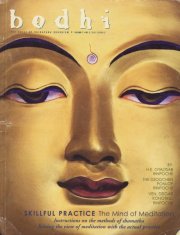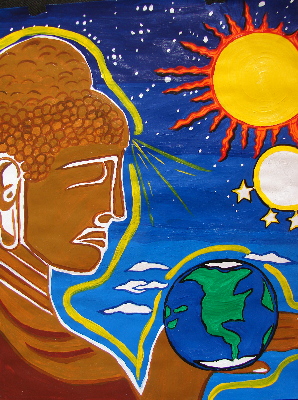Activities
Projects


Bodhi Magazine
HOPE FOR A PEACEFUL FUTURE - An interview with His Holiness
the 17th Karmapa, Ogyen Trinley Dorje
by Charlee Parkinson
Published Articles

The day of the interview arrived with a pleasant pre-monsoon rain and a beautiful sunrise illuminating the road to the Indian village of Sidbhari, and Gyuto Ramoche Tantric University, His Holiness the 17th Karmapa's temporary residence in India.
Surrounded by lush fields of rice and guarded by majestic, snow capped Himalayan mountains, the golden temple of Gyuto seems to sit as if in deep meditation itself, echoing a timeless practice of stillness. As we arrive, a sense of greatness seems to permeate the air. We begin our ascent into the golden temple, escorted by armed police and regal attendants, to the private audience quarters on the top floor of the building. As a Westerner of the same generation as His Holiness, I had come to voice the concerns of the youth I had interviewed for a documentary I am producing and to ask His Holiness's advice on how we can contribute to a peaceful future, as a human society.
As His Holiness Karmapa entered the room, His gait was soft and steady with the posture of a meditator steeped in wisdom. With a sharp and penetrating presence, he had a perfect awareness of everything that was happening both in the room and our world. During the interview, His Holiness's clear insight into the issues faced by the youth of today, as a global community, inspired a deep sense of trust in me as a human being of this present genera¬tion. He is a great inspiration for us in these troubled times as young and old, Asian and Westerner, Buddhist and non-Buddhist alike seem drawn to seek his blessing so they can better navigate their lives. For the younger generation, His Holiness is a symbol of hope and courage; my gratitude for His wisdom is boundless. May it be of benefit.
Interview with His Holiness the 17th Karmapa, Ogyen Trinley Dorjee- Gyuto Monastery, Sidbhari India
June 13th 2003
Translated by Ngodup Tsering
Charlee Parkinson: A lot of people feel angry when they see what is happening in the world. There are many examples of leaders making decisions based on greed and corruption. What is the best way one can direct the anger they may feel in a constructive way?
His Holiness Karmapa: People must understand there is no point in getting angry or upset about the unfair situations on the world. This would be counter produc¬tive, given that the majority of the people in the world probably feel differently. Each individual has to realize that they have a responsibility to be forthright, to be honest and to maintain the responsibility of integrity. If this is the kind of responsibility that each and every individual can maintain by himself or herself, then obviously the few people who indulge in greed and corruption will have very little power left.
CP: How do we encourage people to take personal responsibility for our world? It is so easy to blame outside circumstances over which we have no control.
HHK: What is important for everyone to realize is that society is made up of individuals. Without a good number of individuals coming together, there would be no society. Therefore, each and every individual educates himself or herself to the fact that they have a responsibility to the society because they make up the society. Dependent on the actions of these individuals, if they choose to indulge in harmful, disturbing and selfish activities, then the result will be a great loss and harm for all. On the other hand, if the individuals turn towards wholesome ways, considerate thinking and so forth, then they will be contri¬buting to the well-being of the whole. For instance, there is tremendous destruction and degradation in the area of environment. The environment is not doing this to itself; it is being done by the individuals that make up the society, those who don't care or see the need of goodness in the future. So they indulge in these kinds of things and as a result there is a loss for all involved. Each individual must realize that they are part of society and they affect the whole.
CP: Group consciousness begins with individuals?
HHK: Yes. The change in the world is a result of a collection of individuals and their popular collective attitude and activities.
CP: What about people who live in small towns and remote places? How can they have an effect on global circumstances?
HHK: My personal feeling is that, given the present situation in the world, whether or not you can have any impact is not dependent on where you are—it is dependent on interactions and communications. These days, because of technology and all the means of communication that are present in the world,
I don't feel that living in a remote place means you won't be able to have an impact. The world has become very, very small. Unless you choose not to, you have the opportunity to be part of the network of communications. If individuals are educated properly in that direction, then yes, they can have an impact.
CP: Young people have a strong attraction to escapism these days through the use of drugs, alcohol, and indulging in worldly desires, all of which are heavily displayed through our media and music. How can we resist this type of tempta¬tion when it seems the most influential power we have surrounding us?
HHK: First, young people must realize, I feel, that whatever disturbing or seemingly intimidating situations exist in the world, these have all been created by people. Any such situa¬tion is not some sort of stagnant, stationary thing that exists; people have created it. So that the fact that people can create negative activities or disturbing situations means that people can also create the opposite. In this way, the possibility of flex¬ibility is there. It is possible that what has been created can be broken down and that new realities and new possibilities can be created. So, personally, I feel that such negative situations should not be intimidating or a cause of fear. If things appear to you as intimidating or disturbing and then as a way of escaping or ignoring them you indulge in drugs, alcohol, or whatever else, which are very confusing to your mind, then what you are doing is succumbing to the existing situation and making a situation that is already bad, worse. For instance, you can look at different things that happen in the media. Individuals must realize that this is to test the gullibility of people. If we show how gullible we are, then it is very easy for us to become the victims of media advertisements and manipulations. It is our responsibility to wake up to the fact that we have the abil¬ity to stand on our own without things that are for the purpose of manipulation.
CP: What would it take to change the world Your Holiness?
HHK: The present situation in the world seems to be this way. When there are a few people who are involved in harmful activities, they seem to make a big difference in negative ways. Whereas, if there are a similar number of people doing things that are beneficial toward the world, then it seems they are having little affect. What does this tell us? This tells us that there are more people in the world involved in harmful things rather than beneficial things. That's why, when there are some beneficial activi¬ties taking place, they seem to make very little difference. People need to awaken to the fact that everyone has a responsibility. If there is to be peace and harmony, which is appreciated, which is desired, then every individual should take responsibility to contribute toward that. The more people become involved in beneficial activity, the greater the result will be.
CP: With all due respect, Your Holiness, you are eighteen years old. At the age of fourteen, you made the courageous escape from Tibet, leaving behind your monastery, monks, parents and siblings. Here in India, you are facing incredible challenges, such as not being able to travel to the places your presence is requested. What is it inside you that motivates you to remain so confident and at the same time to be such an effective Source of inspiration for others?
HHK: Basically I don't regard myself as a broad-minded person, or a person who has a very accommodating mind, but I do think of myself as a very sensitive person. Nevertheless, in the years that I have been around, my only training has been in the teachings of Buddhism. It seems to be quite obvious that any strength I may have comes from these teachings. The Buddhist teachings clearly point out the truth of interdependence, the truth of cause and effect, or the truth of karma—be it individual or collective; they point out, as well, the truth of imperma¬nence and the truth of the transitory nature—just as it is in our real life experience. So, being in the world that we are in, everybody is part of this transitory impermanence and interdependence, which is so constantly changing and so constantly in motion. If one were to take it as real and get carried away by it in a negative way, then that obviously doesn't make any sense. It's possible the real situation or the practical situation is not that way. So, yes, if there is any kind of strength that I may seem to exhibit, it comes from the strength of the truth of the teachings. That's what I feel.
CP: The word "enlightenment" is heard often in the West these days. What is enlightenment?
HHK: It is something not so easy to describe. But basically, or essentially from a Buddhist point of view, anyone who has become totally free of all limitations and all defects, who has achieved all aspects of wisdom and insight, is enlightened, or has attained the state of buddhahood. So, what does this mean to become free of all limitations? It means to become free of those patterns of mind that cause obscuration. It means totally uprooting and becoming free of all patterns that cause suffering, such as attachment, anger, jealousy, desire, ignorance and so forth, and having complete insight into the essential nature of one's being, or mind. This is not talking about the accumulation of just simple intellectual knowledge, or the collecting of worldly experience. This is talking about complete insight into the nature of one's mind. The only example I can think of right now would be if you were looking down on the world from space, and the world is sort of in the palm of your hand. Everything is clear and vivid; nothing is barring your mind. Probably that is enlightenment.
CP: So enlightenment is freedom?
HHK: Yes. Great freedom, total freedom... Thank you.
For Kyabje Bokar Rinpoche
©2003 Charlee Parkinson/Thunderbolt Productions.
Society & Environment BODHI VOLUME 7, NO. 2
[ Your Text Here ]

